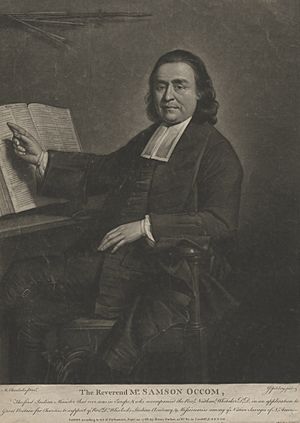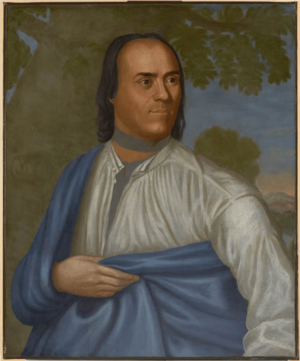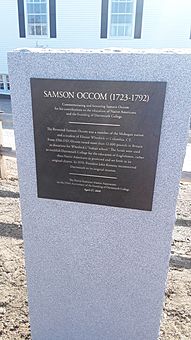Samson Occom facts for kids
Samson Occom (born 1723 – died July 14, 1792) was an important member of the Mohegan nation. He was from a place near New London, Connecticut. Occom became a Presbyterian minister.
He was one of the first Native Americans to publish his writings in English. He was also the first Native American to write his own life story. Occom helped start several settlements, including the one that became known as the Brothertown Indians. He worked with missionary John Eliot to share Christian ideas with Native American communities. He also helped them learn about European culture.
Contents
Early Life and Learning
Samson Occom was born to Joshua Tomacham and Sarah. Many believe he was a descendant of Uncas, a famous Mohegan chief.
When he was about 16 or 17, Occom heard Christian preachers during a time of religious revival called the Great Awakening. This experience changed his life. In 1743, he began to study religion at the "Lattin School." This school was run by a minister named Eleazar Wheelock. Occom stayed there for four years.
During his studies, Occom improved his English. He also learned to read and speak Latin, Greek, and Hebrew. The only book he owned as a young man was the Bible. From 1747 to 1749, Occom continued his studies with Reverend Solomon Williams in New London, Connecticut.
Occom's Career and Work
Occom became a teacher, preacher, and judge. He worked among the Montaukett Native Americans in Montauk, on Long Island. He married Mary Fowler, a Montaukett woman. Occom helped some of the Pequot people he worked with. He showed them how to adopt European-style houses and clothing.
On August 30, 1759, he officially became a minister. This was done by a group of church leaders in Suffolk. Even though he was promised the same pay as white preachers, Occom never received it. He lived in poverty for much of his life. A group called The Society in Scotland for Propagating Christian Knowledge gave him some money, but it was not enough.
In 1761 and 1763, Occom traveled to the Six Nations of the Iroquois in upstate New York to preach. He did not gain many new followers there. He then returned to teach in Mohegan, Connecticut. Occom was very familiar with both colonist and Native American cultures. This helped him act as a peacemaker between the two groups. His missionary work also made him a respected leader. He helped improve relations between Native American tribes.
Raising Money for Education
Eleazar Wheelock, Occom's former teacher, had started a school for Native American students in Lebanon, Connecticut. It was called Moor's Charity School. Wheelock asked Occom to travel to England to raise money for the school.
Occom sailed from Boston on December 23, 1765. He did not return until May 20, 1768. He preached across Britain from February 1766 to July 1767. He gave between 300 and 400 sermons. Large crowds came to hear him speak. He raised over £12,000 for Wheelock's school. Even King George III donated money.
However, when Occom returned, he learned that Wheelock had not taken care of Occom's wife and children while he was away. Wheelock also moved to New Hampshire. He used the money Occom raised to start Dartmouth College. This college was named after an English earl. But it was mainly for the sons of American colonists, not Native Americans. This was a broken promise to Occom. Even 200 years later, very few Native American students had graduated from Dartmouth.
Land Disputes and Reputation
In 1764, Occom spoke out against selling tribal lands. He was involved in the "Mason Controversy." This was a long disagreement over land between the colonists and the Mohegan people. The Mohegans teamed up with the Mason family to ask the governor of Connecticut to return their lands.
When Occom came back to the Mohegans, he supported their fight for the land. This made the missionaries upset. They threatened to take away his preaching license. They also threatened to stop paying for his missionary work. Colonists began spreading false rumors about Occom. They said he only pretended to be Christian. These rumors hurt Occom's good name, especially after his successful fundraising in England. Wheelock even suggested that Occom did not truly care about Christianity. This helped Wheelock regain his authority. Wheelock's words made people doubt Occom as a preacher.

In 1768, Occom wrote A Short Narrative of My Life. This was a ten-page handwritten story about his life. It was not published until 1982. Occom also published Sermon at the Execution of Moses Paul and A Choice Collection of Hymns and Spiritual Songs in 1774. These writings give a different view of how colonists and Native Americans interacted.
Later Life and Ministry
After returning from England, Occom lived with his Mohegan people. Because of Wheelock's betrayal, Occom worked with his son-in-law Joseph Johnson and others. They wanted to organize Christian Native Americans from New England and Long Island into a new tribe in Upstate New York.
On October 4, 1774, the Oneida people gave land to these East Coast Native Americans. By 1775, the first group began to move. The American Revolution caused problems for them. Many went to live with the Stockbridge people in Massachusetts. They returned in 1785. Occom, Joseph Johnson, and David Fowler led the people back. They rebuilt their settlement near what is now Waterville, New York. They called it Brothertown.
The Oneida also invited other Christian Native Americans to live with them. These included the Stockbridge Mohican people from Massachusetts. Two Lenape groups from New Jersey also joined. The Mohicans started their own village called New Stockbridge near Oneida Lake. Occom made sure these villages received official civil charters in 1787. He also worked to remove white settlers from Brothertown.
Samson Occom died on July 14, 1792, in New Stockbridge. He is believed to be buried near Deansboro, New York.
Occom's Legacy
After Occom's death, in the 1820s, many Brothertown Indians moved. They accepted money from New York State for their land. They were moved to what is now the town of Brothertown in Calumet County, Wisconsin. Today, the Brothertown Indians are still working to be officially recognized as a tribe by the government.
In World War II, the United States liberty ship SS Samson Occom was named in his honor.
Several places around Dartmouth College in Hanover, New Hampshire, are named after Occom. These include Occom Pond and Occom Ridge. The Native American Studies program at Dartmouth has a Samson Occom professorship. A community space at the college is also named Occom Commons. Eastern Connecticut State University in Willimantic, Connecticut, also named a residence hall after him.
The Norwich, Connecticut neighborhood of Occum is named for Samson Occom.
The Brothertown Indians celebrate Samson Occom Day as an official Tribal holiday every July 14.
On April 27, 2019, the Native American Alumni Association of Dartmouth College put up a memorial. It is at the site of Moor's Charity School in Columbia, CT. It honors Samson Occom for his work in educating Native Americans and his role in the founding of Dartmouth College.
Works by Samson Occom
- A Choice Collection of Hymns and Spiritual Songs, New London, Connecticut: Press of Thomas and Samual Green, 1774.
- A Sermon Preached at the Execution of Moses Paul, An Indian Who Was Executed at New Haven on the 2nd of September 1772 for the Murder of Mr. Moses Cook, late of Waterbury, on the 7th of December 1771, New Haven: Press of Thomas and Samual Green, 1772.
- "A Short Narrative of My Life". The Elders Wrote: An Anthology of Early Prose by North American Indians 1768-1931. Ed. Bernd Peyer. Berlin: Dietrich Reimer Verlag, 1982 [1762], 12–18.
- Journals, 1754 and 1786(?), Unpublished manuscript in collection of New London County Historical Society.
- Herbs and Roots, Unpublished manuscript in collection of New London County Historical Society.
- The Collected Writings of Samson Occom, Mohegan. Ed. Joanna Brooks. New York: Oxford University Press, 2006.
See also
- Native American temperance activists
 | Delilah Pierce |
 | Gordon Parks |
 | Augusta Savage |
 | Charles Ethan Porter |




